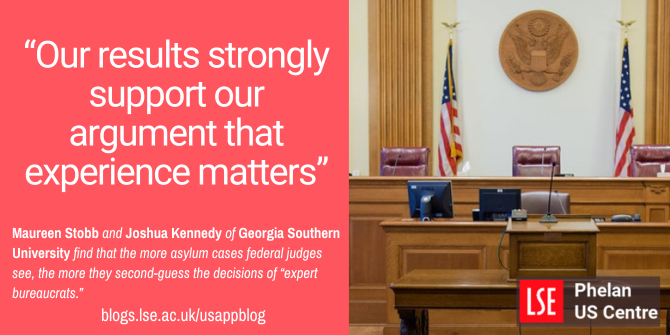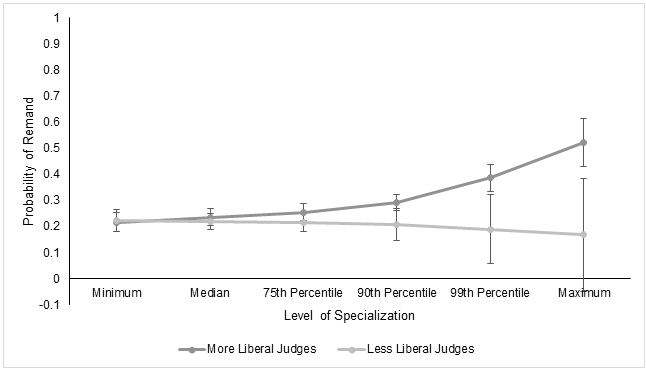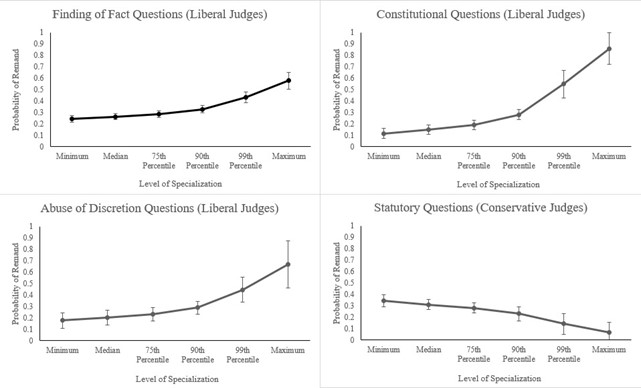
 Thousands of individuals seeking asylum in the US are awaiting decisions, and many question whether bureaucrats give them a fair hearing. In new research, Maureen Stobb and Joshua Kennedy examine federal judges’ oversight of asylum cases. They find that as judges see more asylum cases, they become more willing to act on their own policy preferences. They provide a check to the bureaucracy, but the outcome is not policy neutral; more liberal judges side against the agency, while more conservative side with the agency’s decision.
Thousands of individuals seeking asylum in the US are awaiting decisions, and many question whether bureaucrats give them a fair hearing. In new research, Maureen Stobb and Joshua Kennedy examine federal judges’ oversight of asylum cases. They find that as judges see more asylum cases, they become more willing to act on their own policy preferences. They provide a check to the bureaucracy, but the outcome is not policy neutral; more liberal judges side against the agency, while more conservative side with the agency’s decision.
A key political and moral question is the proper treatment of those seeking refuge within the borders of the United States. Individuals have a right to seek asylum, and states have a duty not to return them to persecution. The difficulty lies in properly determining if they meet the legal definition of a refugee, which leaves room for governments to exercise a good deal of discretion in determining who deserves protection.
Bureaucrats in the Board of Immigration Appeals (part of the Department of Justice) who make the initial determination are overwhelmed with the sheer number of these cases. Researchers have found clear patterns of repeated errors in these cases. Some argue the federal courts of appeals are the last bastion of hope in a world of seemingly arbitrary administrative decision making and suggest the creation of a specialized court in immigration. It is unclear if generalist federal judges would be willing to challenge administrative decisions made by specialists, particularly given that the law directs them to defer to bureaucrats on many critical issues, and they are assumed to have less knowledge of the facts and law in this area than administrative decision makers. Even if judges overcame these challenges, the consequences of specialization in asylum are substantial and uncertain.
The generalist judge may be a myth.
Modern government is specialized, but the generalist judge is supposed to be an exception to this trend, moving beyond the narrow perspective of the experts. But research suggests federal judges can specialize in subject areas, through writing opinions and potentially by repeatedly hearing one type of case. The high number of asylum cases heard by some federal courts may give them an opportunity to specialize in this area. Even in circuits with a relatively low number of immigration cases, federal judges have been emboldened to criticize bureaucratic decisions as they see more and more of them. One well known judge on the Seventh Circuit, Judge Richard Posner, famously complained: “the adjudication of [immigration] cases at the administrative level has fallen below the minimum standards of legal justice.”
Investigating the impact of experience in asylum cases
In new research, we have added some evidence that not only indicates that federal judges can become specialists, but points to the important policy implications of increased exposure to these cases. Our work assesses federal court judges’ decision making in 4,343 U.S. Courts of Appeals asylum cases between 2002-2017. We combine data on judges’ policy preferences from another study with our own coding of the legal issues, key facts, and our new measure of a judges’ experience — the number of asylum appeals a judge has heard before the case is decided. With this data, we look at the effect of judges’ asylum experience as it interacts with judge’s policy preferences and the law in each case on the likelihood that an individual judge would vote to tell the administrative decision maker decide the case differently (a remand).
We argue that asylum experience emboldens judges to second-guess bureaucrats, but whether they tell administrators to grant asylum will depend on the judge’s policy preferences. We expected that as more liberal judges gain experience with asylum cases, they will be more tell bureaucrats to grant asylum. Less liberal judges will be more likely to leave the asylum denial in place. We also posited that judges’ level of experience in asylum would matter most when the law tells them they must defer to experts in immigration. If these legal standards matter, then experience would have the most impact when a case includes a factual issue, such as whether the person claiming asylum showed that they were persecuted in their home country. Experience should also make a difference when there is a question of how to interpret a statute or regulation in a case.

“Courtroom” (CC BY 2.0) by karen_neoh
Experience matters
Our results strongly support our argument that experience matters. In fact, it matters more than we expected. Figure 1 below shows that, as judges’ experience in asylum cases (or level of specialization) increases, more liberal judges become increasingly likely to tell bureaucrats to reconsider their asylum denial (a remand). Experience has the opposite effect for a less liberal, or conservative, judge. The impact is much bigger for liberal judges. We argue that without experience more liberal judges feel constrained to defer to the administrative adjudicator’s denial of asylum, but as these judges grow in experience, they feel freer to reject it.
Figure 1 – The Impact of Experience and Politics on Asylum

Decisions
Surprisingly, experience matters in areas of law where we did not think it would — issues of constitutional interpretation where judges do not owe any deference to administrative decision makers. It also matters when a bureaucrat’s discretionary decision is challenged, where the level of deference is so high, we did not think any level of experience would prompt judicial scrutiny. As Figure 2 below shows, experience matters a good deal in all these cases, but the actual impact in terms of whether asylum is granted depends on the policy preferences of the judges.
Figure 2 – The Impact Experience, Politics, and the Law on Asylum Decisions

Our work further challenges the idea of the generalist judge, suggesting that a type of experience that is broadly applicable across the federal courts of appeal can significantly affect the likelihood that a person seeking refuge in the United States is granted asylum. Reliance on the courts to solve this moral and political controversy may mean greater influence for the law and perhaps a reduction in arbitrary decision making, but it may also amplify the impact of judges’ politics.
- This article is based on the paper, ‘Judicial Specialization and Deference in Asylum Cases on the U.S. Courts of Appeals’, in American Political Science Review.
- Please read our comments policy before commenting.
- Note: This article gives the views of the author, and not the position of USAPP – American Politics and Policy, nor the London School of Economics.
- Shortened URL for this post: https://bit.ly/4apo5IY






